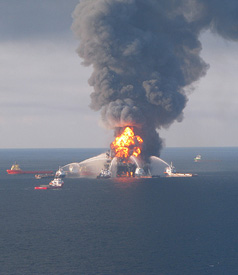One thing you don’t hear much mention of in all the coverage of the BP oil rig blowout that is now pouring 210,000 gallons of oil a day into the Gulf of Mexico, just a few dozen miles off the coast of Louisiana, is the 2010 hurricane season, which officially starts on June 1, but which can start significantly earlier.
This is, after all, an El Nino year, so storms could be more frequent and stronger than usual. In 2007, recall, the first storm of the season was Tropical Storm Andrea, which reached a size strong enough to merit a name on May 7.
Why does this matter? Because any attempt to use booms or chemicals keep the oil away from the Gulf Coast would be completely impossible in the event of a major storm entering the Gulf. The combination of high winds, storm surges and high waves would push the oil slick way inland up the bayous and onto the shelter islands that protect 40 percent of America’s wetlands.
It could do worse, too. The strong winds in hurricanes, sweeping across the surging waves they have created, suck up a considerable amount of surface water and blow it inland. This time, however, those winds could also end up picking up a considerable amount of the oil slick floating on the sea’s surface, which would be deposited as rain well inland, damaging croplands and forests, too.
Meanwhile, NASA and government scientists are warning that the well could end up turning into a gusher, releasing as much as 2 million gallons of oil a day into the Gulf – ten times the amount currently coming out of the broken well.
Why isn’t anybody talking about this hurricane issue? A Google search for the words “hurricane season” and “BP Oil leak” turned up lots of references to the “devastation of Hurricane Katrina,” but there is nary an article in a major news story about what effect this year’s hurricanes might have on the clean-up effort from what is likely to be a bigger oil disaster than the Exxon Valdez spill in Alaska.
So far, it’s looking increasingly likely that there will be no quick shutdown of the blown-out BP well, meaning that it could keep spewing out its contents into the Gulf, probably at an increasing rate, for several months. That would put it well into the middle of this year’s hurricane season, making it almost certain that at least one hurricane or tropical storm will pass right over the area and push that giant oil slick ashore.
And that’s not to mention what effect an untimely hurricane might have on any attempts to shut down the well. The most likely strategy is drilling several new wells that could both relieve the pressure on the current well, and also that could be used to pump mud or concrete or some other heavy, thick compound into the leaking well to try and stop it up. A major hurricane could wreak havoc with the new drilling rigs, particularly if only smaller ones are available for the job on short notice. A hurricane could also thwart efforts to drop a large tent over the leaking well – another scheme that is being contemplated, that would presumably funnel the rising crude oil into pipes that could deliver it to tankers for removal.
So far, all the talk has been about the urgency of getting booms in place to keep the oil slick from coming ashore, which it is starting to do now. But the real urgency should be to try to shut the thing down securely before the first hurricane hits, and to get as much of the already floating oil either chemically treated, burned off or skimmed before that hurricane arrives and blows it all ashore.
If you want a real disaster scenario, imagine this: a big hurricane – say Category 4 or 5 – enters the Gulf and heads straight for New Orleans again, and blows out the levees again. Last time, there was a fairly toxic stew of water covering much of the city. This time it would be water mixed with millions of gallons of crude oil.
The Katrina disaster would look like a picnic by comparison.
Hmmmm. No wonder neither BP nor the government are talking about hurricanes.
They really don’t have much they can do except cross their fingers.
The idea that the president’s expanded offshore drilling plan is still on the table is simply appalling.
Media that fights fascism
Truthout is funded almost entirely by readers — that’s why we can speak truth to power and cut against the mainstream narrative. But independent journalists at Truthout face mounting political repression under Trump.
We rely on your support to survive McCarthyist censorship. Please make a tax-deductible one-time or monthly donation.
